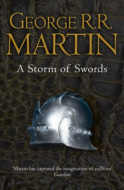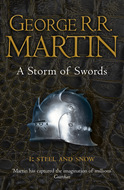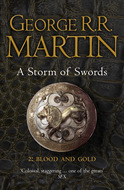Kitap dosya olarak indirilemez ancak uygulamamız üzerinden veya online olarak web sitemizden okunabilir.
Kitabı oku: «A Game of Thrones: The Story Continues Books 1-5», sayfa 73
Across the noisy common room, Salladhor Saan sat eating grapes from a wooden bowl. When he spied Davos, he beckoned him closer. “Ser knight, come sit with me. Eat a grape. Eat two. They are marvelously sweet.” The Lyseni was a sleek, smiling man whose flamboyance was a byword on both sides of the narrow sea. Today he wore flashing cloth-of-silver, with dagged sleeves so long the ends of them pooled on the floor. His buttons were carved jade monkeys, and atop his wispy white curls perched a jaunty green cap decorated with a fan of peacock feathers.
Davos threaded his way through the tables to a chair. In the days before his knighthood, he had often bought cargoes from Salladhor Saan. The Lyseni was a smuggler himself, as well as a trader, a banker, a notorious pirate, and the self-styled Prince of the Narrow Sea. When a pirate grows rich enough, they make him a prince. It had been Davos who had made the journey to Lys to recruit the old rogue to Lord Stannis’s cause.
“You did not see the gods burn, my lord?” he asked.
“The red priests have a great temple on Lys. Always they are burning this and burning that, crying out to their R’hllor. They bore me with their fires. Soon they will bore King Stannis too, it is to be hoped.” He seemed utterly unconcerned that someone might overhear him, eating his grapes and dribbling the seeds out onto his lip, flicking them off with a finger. “My Bird of Thousand Colors came in yesterday, good ser. She is not a warship, no, but a trader, and she paid a call on King’s Landing. Are you sure you will not have a grape? Children go hungry in the city, it is said.” He dangled the grapes before Davos and smiled.
“It’s ale I need, and news.”
“The men of Westeros are ever rushing,” complained Salladhor Saan. “What good is this, I ask you? He who hurries through life hurries to his grave.” He belched. “The Lord of Casterly Rock has sent his dwarf to see to King’s Landing. Perhaps he hopes that his ugly face will frighten off attackers, eh? Or that we will laugh ourselves dead when the Imp capers on the battlements, who can say? The dwarf has chased off the lout who ruled the gold cloaks and put in his place a knight with an iron hand.” He plucked a grape, and squeezed it between thumb and forefinger until the skin burst. Juice ran down between his fingers.
A serving girl pushed her way through, swatting at the hands that groped her as she passed. Davos ordered a tankard of ale, turned back to Saan, and said, “How well is the city defended?”
The other shrugged. “The walls are high and strong, but who will man them? They are building scorpions and spitfires, oh yes, but the men in the golden cloaks are too few and too green, and there are no others. A swift strike, like a hawk plummeting at a hare, and the great city will be ours. Grant us wind to fill our sails, and your king could sit upon his Iron Throne by evenfall on the morrow. We could dress the dwarf in motley and prick his little cheeks with the points of our spears to make him dance for us, and mayhaps your goodly king would make me a gift of the beautiful Queen Cersei to warm my bed for a night. I have been too long away from my wives, and all in his service.”
“Pirate,” said Davos. “You have no wives, only concubines, and you have been well paid for every day and every ship.”
“Only in promises,” said Salladhor Saan mournfully. “Good ser, it is gold I crave, not words on papers.” He popped a grape into his mouth.
“You’ll have your gold when we take the treasury in King’s Landing. No man in the Seven Kingdoms is more honorable than Stannis Baratheon. He will keep his word.” Even as Davos spoke, he thought, This world is twisted beyond hope, when lowborn smugglers must vouch for the honor of kings.
“So he has said and said. And so I say, let us do this thing. Even these grapes could be no more ripe than that city, my old friend.”
The serving girl returned with his ale. Davos gave her a copper. “Might be we could take King’s Landing, as you say,” he said as he lifted the tankard, “but how long would we hold it? Tywin Lannister is known to be at Harrenhal with a great host, and Lord Renly …”
“Ah, yes, the young brother,” said Salladhor Saan. “That part is not so good, my friend. King Renly bestirs himself. No, here he is Lord Renly, my pardons. So many kings, my tongue grows weary of the word. The brother Renly has left Highgarden with his fair young queen, his flowered lords and shining knights, and a mighty host of foot. He marches up your road of roses toward the very same great city we were speaking of.”
“He takes his bride?”
The other shrugged. “He did not tell me why. Perhaps he is loath to part with the warm burrow between her thighs, even for a night. Or perhaps he is that certain of his victory.”
“The king must be told.”
“I have attended to it, good ser. Though His Grace frowns so whenever he does see me that I tremble to come before him. Do you think he would like me better if I wore a hair shirt and never smiled? Well, I will not do it. I am an honest man, he must suffer me in silk and samite. Or else I shall take my ships where I am better loved. That sword was not Lightbringer, my friend.”
The sudden shift in subject left Davos uneasy. “Sword?”
“A sword plucked from fire, yes. Men tell me things, it is my pleasant smile. How shall a burned sword serve Stannis?”
“A burning sword,” corrected Davos.
“Burned,” said Salladhor Saan, “and be glad of that, my friend. Do you know the tale of the forging of Lightbringer? I shall tell it to you. It was a time when darkness lay heavy on the world. To oppose it, the hero must have a hero’s blade, oh, like none that had ever been. And so for thirty days and thirty nights, Azor Ahai labored sleepless in the temple, forging a blade in the sacred fires. Heat and hammer and fold, heat and hammer and fold, oh yes, until the sword was done. Yet when he plunged it into water to temper the steel it burst asunder.
“Being a hero, it was not for him to shrug and go in search of excellent grapes such as these, so again he began. The second time it took him fifty days and fifty nights, and this sword seemed even finer than the first. Azor Ahai captured a lion, to temper the blade by plunging it through the beast’s red heart, but once more the steel shattered and split. Great was his woe and great was his sorrow then, for he knew what he must do.
“A hundred days and a hundred nights he labored on the third blade, and as it glowed white hot in the sacred fires, he summoned his wife. ‘Nissa Nissa,’ he said to her, for that was her name, ‘bare your breast, and know that I love you best of all that is in this world.’ She did this thing, why I cannot say, and Azor Ahai thrust the smoking sword through her living heart. It is said that her cry of anguish and ecstasy left a crack across the face of the moon, but her blood and her soul and her strength and her courage all went into the steel. Such is the tale of the forging of Lightbringer, the Red Sword of Heroes.
“Now do you see my meaning? Be glad that it is just a burned sword that His Grace pulled from that fire. Too much light can hurt the eyes, my friend, and fire burns.” Salladhor Saan finished the last grape and smacked his lips. “When do you think the king will bid us sail, good ser?”
“Soon, I think,” said Davos, “if his god wills it.”
“His god, ser friend? Not yours? Where is the god of Ser Davos Seaworth, knight of the onion ship?”
Davos sipped his ale to give himself a moment. The inn is crowded, and you are not Salladhor Saan, he reminded himself. Be careful how you answer. “King Stannis is my god. He made me and blessed me with his trust.”
“I will remember.” Salladhor Saan got to his feet. “My pardons. These grapes have given me a hunger, and dinner awaits on my Valyrian. Minced lamb with pepper and roasted gull stuffed with mushrooms and fennel and onion. Soon we shall eat together in King’s Landing, yes? In the Red Keep we shall feast, while the dwarf sings us a jolly tune. When you speak to King Stannis, mention if you would that he will owe me another thirty thousand dragons come the black of the moon. He ought to have given those gods to me. They were too beautiful to burn, and might have brought a noble price in Pentos or Myr. Well, if he grants me Queen Cersei for a night I shall forgive him.” The Lyseni clapped Davos on the back, and swaggered from the inn as if he owned it.
Ser Davos Seaworth lingered over his tankard for a good while, thinking. A year and a half ago, he had been with Stannis in King’s Landing when King Robert staged a tourney for Prince Joffrey’s name day. He remembered the red priest Thoros of Myr, and the flaming sword he had wielded in the melee. The man had made for a colorful spectacle, his red robes flapping while his blade writhed with pale green flames, but everyone knew there was no true magic to it, and in the end his fire had guttered out and Bronze Yohn Royce had brained him with a common mace.
A true sword of fire, now, that would be a wonder to behold. Yet at such a cost … When he thought of Nissa Nissa, it was his own Marya he pictured, a good-natured plump woman with sagging breasts and a kindly smile, the best woman in the world. He tried to picture himself driving a sword through her, and shuddered. I am not made of the stuff of heroes, he decided. If that was the price of a magic sword, it was more than he cared to pay.
Davos finished his ale, pushed away the tankard, and left the inn. On the way out he patted the gargoyle on the head and muttered, “Luck.” They would all need it.
It was well after dark when Devan came down to Black Betha, leading a snow white palfrey. “My lord father,” he announced, “His Grace commands you to attend him in the Chamber of the Painted Table. You are to ride the horse and come at once.”
It was good to see Devan looking so splendid in his squire’s raiment, but the summons made Davos uneasy. Will he bid us sail? he wondered. Salladhor Saan was not the only captain who felt that King’s Landing was ripe for an attack, but a smuggler must learn patience. We have no hope of victory. I said as much to Maester Cressen, the day I returned to Dragonstone, and nothing has changed. We are too few, the foes too many. If we dip our oars, we die. Nonetheless, he climbed onto the horse.
When Davos arrived at the Stone Drum, a dozen highborn knights and great bannermen were just leaving. Lords Celtigar and Velaryon each gave him a curt nod and walked on while the others ignored him utterly, but Ser Axell Florent stopped for a word.
Queen Selyse’s uncle was a keg of a man with thick arms and bandy legs. He had the prominent ears of a Florent, even larger than his niece’s. The coarse hair that sprouted from his ears did not stop him hearing most of what went on in the castle. For ten years Ser Axell had served as castellan of Dragonstone while Stannis sat on Robert’s council in King’s Landing, but of late he had emerged as the foremost of the queen’s men. “Ser Davos, it is good to see you, as ever,” he said.
“And you, my lord.”
“I made note of you this morning as well. The false gods burned with a merry light, did they not?”
“They burned brightly.” Davos did not trust this man, for all his courtesy. House Florent had declared for Renly.
“The Lady Melisandre tells us that sometimes R’hllor permits his faithful servants to glimpse the future in flames. It seemed to me as I watched the fire this morning that I was looking at a dozen beautiful dancers, maidens garbed in yellow silk spinning and swirling before a great king. I think it was a true vision, ser. A glimpse of the glory that awaits His Grace after we take King’s Landing and the throne that is his by rights.”
Stannis has no taste for such dancing, Davos thought, but he dared not offend the queen’s uncle. “I saw only fire,” he said, “but the smoke was making my eyes water. You must pardon me, ser, the king awaits.” He pushed past, wondering why Ser Axell had troubled himself. He is a queen’s man and I am the king’s.
Stannis sat at his Painted Table with Maester Pylos at his shoulder, an untidy pile of papers before them. “Ser,” the king said when Davos entered, “come have a look at this letter.”
Obediently, he selected a paper at random. “It looks handsome enough, Your Grace, but I fear I cannot read the words.” Davos could decipher maps and charts as well as any, but letters and other writings were beyond his powers. But my Devan has learned his letters, and young Steffon and Stannis as well.
“I’d forgotten.” A furrow of irritation showed between the king’s brows. “Pylos, read it to him.”
“Your Grace.” The maester took up one of the parchments and cleared his throat. “All men know me for the trueborn son of Steffon Baratheon, Lord of Storm’s End, by his lady wife Cassana of House Estermont. I declare upon the honor of my House that my beloved brother Robert, our late king, left no trueborn issue of his body, the boy Joffrey, the boy Tommen, and the girl Myrcella being abominations born of incest between Cersei Lannister and her brother Jaime the Kingslayer. By right of birth and blood, I do this day lay claim to the Iron Throne of the Seven Kingdoms of Westeros. Let all true men declare their loyalty. Done in the Light of the Lord, under the sign and seal of Stannis of House Baratheon, the First of His Name, King of the Andals, the Rhoynar, and the First Men, and Lord of the Seven Kingdoms.” The parchment rustled softly as Pylos laid it down.
“Make it Ser Jaime the Kingslayer henceforth,” Stannis said, frowning. “Whatever else the man may be, he remains a knight. I don’t know that we ought to call Robert my beloved brother either. He loved me no more than he had to, nor I him.”
“A harmless courtesy, Your Grace,” Pylos said.
“A lie. Take it out.” Stannis turned to Davos. “The maester tells me that we have one hundred seventeen ravens on hand. I mean to use them all. One hundred seventeen ravens will carry one hundred seventeen copies of my letter to every corner of the realm, from the Arbor to the Wall. Perhaps a hundred will win through against storm and hawk and arrow. If so, a hundred maesters will read my words to as many lords in as many solars and bedchambers … and then the letters will like as not be consigned to the fire, and lips pledged to silence. These great lords love Joffrey, or Renly, or Robb Stark. I am their rightful king, but they will deny me if they can. So I have need of you.”
“I am yours to command, my king. As ever.”
Stannis nodded. “I mean for you to sail Black Betha north, to Gulltown, the Fingers, the Three Sisters, even White Harbor. Your son Dale will go south in Wraith, past Cape Wrath and the Broken Arm, all along the coast of Dorne as far as the Arbor. Each of you will carry a chest of letters, and you will deliver one to every port and holdfast and fishing village. Nail them to the doors of septs and inns for every man to read who can.”
Davos said, “That will be few enough.”
“Ser Davos speaks truly, Your Grace,” said Maester Pylos. “It would be better to have the letters read aloud.”
“Better, but more dangerous,” said Stannis. “These words will not be kindly received.”
“Give me knights to do the reading,” Davos said. “That will carry more weight than anything I might say.”
Stannis seemed well satisfied with that. “I can give you such men, yes. I have a hundred knights who would sooner read than fight. Be open where you can and stealthy where you must. Use every smuggler’s trick you know, the black sails, the hidden coves, whatever it requires. If you run short of letters, capture a few septons and set them to copying out more. I mean to use your second son as well. He will take Lady Marya across the Narrow Sea, to Braavos and the other Free Cities, to deliver other letters to the men who rule there. The world will know of my claim, and of Cersei’s infamy.”
You can tell them, Davos thought, but will they believe? He glanced thoughtfully at Maester Pylos. The king caught the look. “Maester, perhaps you ought get to your writing. We will need a great many letters, and soon.”
“As you will.” Pylos bowed, and took his leave.
The king waited until he was gone before he said, “What is it you would not say in the presence of my maester, Davos?”
“My liege, Pylos is pleasant enough, but I cannot see the chain about his neck without mourning for Maester Cressen.”
“Is it his fault the old man died?” Stannis glanced into the fire. “I never wanted Cressen at that feast. He’d angered me, yes, he’d given me bad counsel, but I did not want him dead. I’d hoped he might be granted a few years of ease and comfort. He had earned that much, at least, but …” He ground his teeth together. “… but he died. And Pylos serves me ably.”
“Pylos is the least of it. The letter … what did your lords make of it, I wonder?”
Stannis snorted. “Celtigar pronounced it admirable. If I showed him the contents of my privy, he would declare that admirable as well. The others bobbed their heads up and down like a flock of geese, all but Velaryon, who said that steel would decide the matter, not words on parchment. As if I had never suspected. The Others take my lords, I’ll hear your views.”
“Your words were blunt and strong.”
“And true.”
“And true. Yet you have no proof. Of this incest. No more than you did a year ago.”
“There’s proof of a sorts at Storm’s End. Robert’s bastard. The one he fathered on my wedding night, in the very bed they’d made up for me and my bride. Delena was a Florent, and a maiden when he took her, so Robert acknowledged the babe. Edric Storm, they call him. He is said to be the very image of my brother. If men were to see him, and then look again at Joffrey and Tommen, they could not help but wonder, I would think.”
“Yet how are men to see him, if he is at Storm’s End?”
Stannis drummed his fingers on the Painted Table. “It is a difficulty. One of many.” He raised his eyes. “You have more to say about the letter. Well, get on with it. I did not make you a knight so you could learn to mouth empty courtesies. I have my lords for that. Say what you would say, Davos.”
Davos bowed his head. “There was a phrase at the end. How did it go? Done in the Light of the Lord …”
“Yes.” The king’s jaw was clenched.
“Your people will mislike those words.”
“As you did?” said Stannis sharply.
“If you were to say instead, Done in the sight of gods and men, or, By the grace of the gods old and new …”
“Have you gone devout on me, smuggler?”
“That was to be my question for you, my liege.”
“Was it now? It sounds as though you love my new god no more than you love my new maester.”
“I do not know this Lord of Light,” Davos admitted, “but I knew the gods we burned this morning. The Smith has kept my ships safe, while the Mother has given me seven strong sons.”
“Your wife has given you seven strong sons. Do you pray to her? It was wood we burned this morning.”
“That may be so,” Davos said, “but when I was a boy in Flea Bottom begging for a copper, sometimes the septons would feed me.”
“I feed you now.”
“You have given me an honored place at your table. And in return I give you truth. Your people will not love you if you take from them the gods they have always worshiped, and give them one whose very name sounds queer on their tongues.”
Stannis stood abruptly. “R’hllor. Why is that so hard? They will not love me, you say? When have they ever loved me? How can I lose something I have never owned?” He moved to the south window to gaze out at the moonlit sea. “I stopped believing in gods the day I saw the Windproud break up across the bay. Any gods so monstrous as to drown my mother and father would never have my worship, I vowed. In King’s Landing, the High Septon would prattle at me of how all justice and goodness flowed from the Seven, but all I ever saw of either was made by men.”
“If you do not believe in gods—”
“—why trouble with this new one?” Stannis broke in. “I have asked myself as well. I know little and care less of gods, but the red priestess has power.”
Yes, but what sort of power? “Cressen had wisdom.”
“I trusted in his wisdom and your wiles, and what did they avail me, smuggler? The storm lords sent you packing. I went to them a beggar and they laughed at me. Well, there will be no more begging, and no more laughing either. The Iron Throne is mine by rights, but how am I to take it? There are four kings in the realm, and three of them have more men and more gold than I do. I have ships … and I have her. The red woman. Half my knights are afraid even to say her name, did you know? If she can do nothing else, a sorceress who can inspire such dread in grown men is not to be despised. A frightened man is a beaten man. And perhaps she can do more. I mean to find out.
“When I was a lad I found an injured goshawk and nursed her back to health. Proudwing, I named her. She would perch on my shoulder and flutter from room to room after me and take food from my hand, but she would not soar. Time and again I would take her hawking, but she never flew higher than the treetops. Robert called her Weakwing. He owned a gyrfalcon named Thunderclap who never missed her strike. One day our great uncle Ser Harbert told me to try a different bird. I was making a fool of myself with Proudwing, he said, and he was right.” Stannis Baratheon turned away from the window, and the ghosts who moved upon the southern sea. “The Seven have never brought me so much as a sparrow. It is time I tried another hawk, Davos. A red hawk.”








